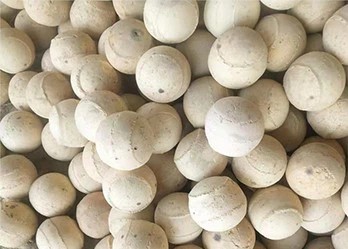PRODUCTS
Magnesia Alumina Refractory Ball
Magnesium alumina balls are alkaline materials with magnesium oxide as the main component and containing alumina. Magnesium-aluminum balls have high density, large heat capacity, strong heat storage capacity, strong thermal conductivity, and excellent slag resistance.
Composition: Premium materials such as high alumina oxide, magnesium oxide, and silicon carbide, with customizable composition based on client requirements.
Form: Available in powder, brick, board, and castable forms to suit various application needs.
Refractoriness: Standard range from 1200°C to 1800°C, with options for higher temperature customization.
Application Fields: Widely used in industries such as steel, cement, glass, and petrochemicals for furnace lining and insulation.
Packaging: Options include 25 kg bags, bulk bags, and custom packaging solutions compliant with global transportation standards.
Introduction
Our experienced R&D team can customize the material, form, and size according to your specific application needs while ensuring compliance with international quality standards. With rigorous quality control and advanced production facilities, we guarantee products with high refractoriness, excellent compressive strength, and long-lasting durability. Whether you are in the steel, cement, glass, or petrochemical industry, we are your trusted partner, supporting the success of your projects.
For customization inquiries, please feel free to contact us. We will provide tailor-made solutions based on your requirements.
Magnesia Alumina Refractory Ball Details
Compared with high-aluminum refractory balls and silica refractory balls, magnesia alumina refractory balls have a higher material density, which increases the unit pebble bed mass and the pebble bed quality coefficient. And its high temperature performance is stable. It can be used safely for a long time under the temperature conditions of 1350~1450 ℃ in the high temperature zone of the upper part of the spherical bed of the ball hot air furnace.
Features
1.High Strength and Durability: They are mechanically strong and durable. They can withstand the mechanical stress and abrasion often encountered in industrial processes.
2.Corrosion Resistance: Mag-alum balls are highly resistant to chemical corrosion and can withstand harsh and corrosive environments.
3.High Temperature Resistance: They exhibit exceptional resistance to high temperatures. They can withstand temperatures well above 1,000°C (1,832°F) without significant structural degradation.
Application
1. Refractory Linings: Magnesia alumina balls are used to create linings in high-temperature industrial furnaces, kilns, and reactors. They are particularly effective in applications where extreme temperatures and corrosive environments are involved, such as in the production of steel, cement, and glass.
2. Non-Ferrous Metals Production: They are used in the production of non-ferrous metals like aluminum and copper. They can be used as a covering material for molten metal to protect it from oxidation and impurities.
3. Fluidized Beds: In fluidized bed applications, such as in the chemical industry, these balls can be used as a bed material for high-temperature reactions and processes. They provide a stable, heat-resistant medium for mixing and reacting with solids, liquids, or gases.
4. Waste Incineration: They are used in the construction of refractory linings for waste incineration plants. They can withstand the high temperatures and corrosive environments encountered during the combustion of waste materials.
5. Glass Production: In glass manufacturing, they can be used as a component of refractory materials for melting and shaping glass at high temperatures.
6. Petrochemical Industry: They are used in various high-temperature processes in the petrochemical industry, such as in the construction of cracking furnaces and catalytic reactors.













